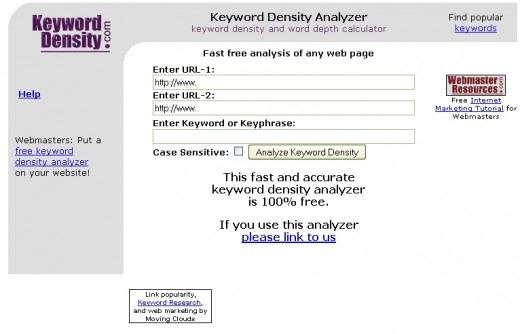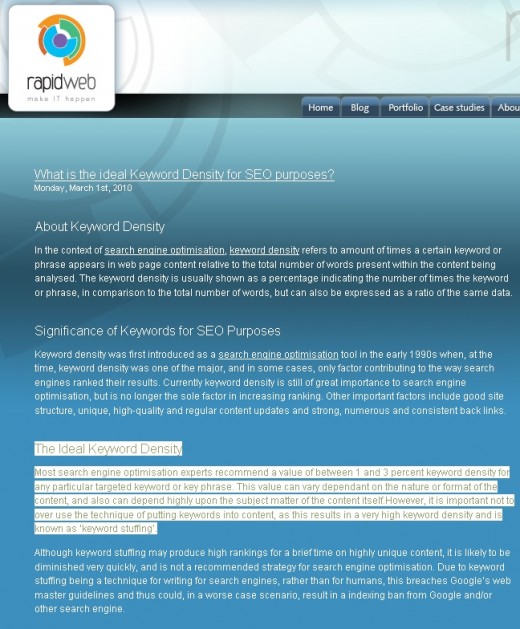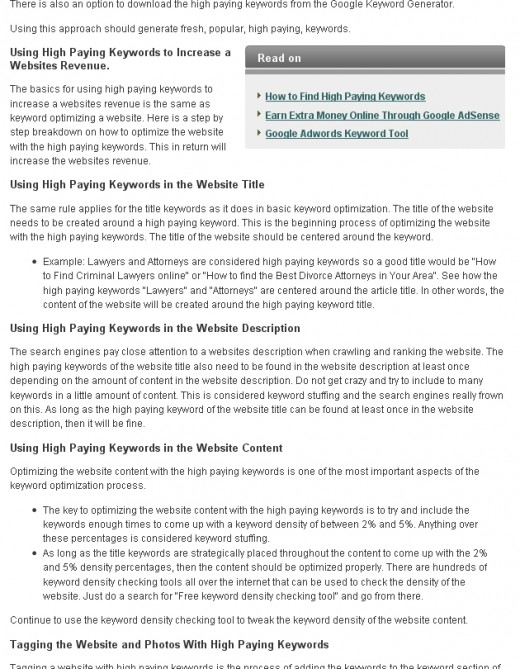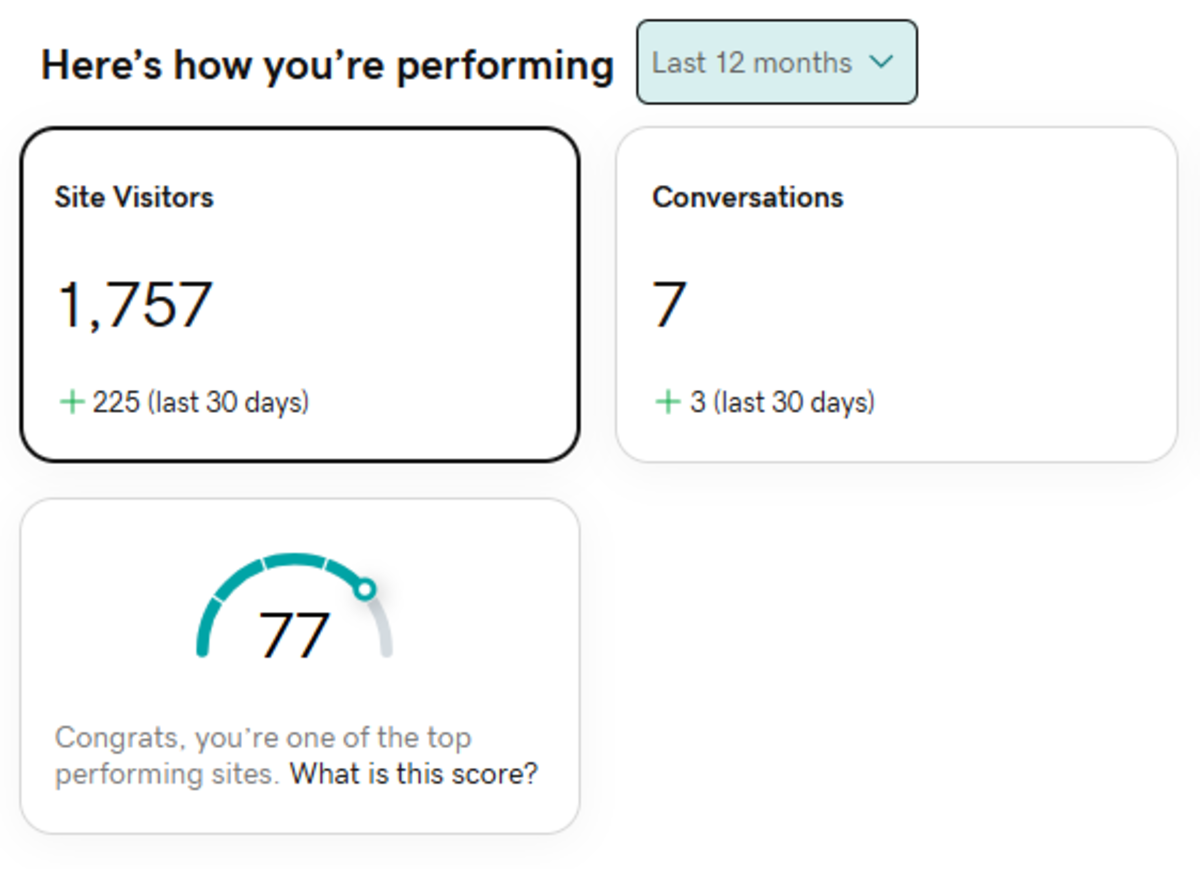Keyword Density: The Truth about Keyword Density
Giving in to temptation yet again
I give up.
I honestly tried, but I can no longer resist the urge to write about keyword density.
There may be a HubPages rule limiting keyword density treatises to no more than one gabillion per day, but the siren's song has simply become too alluring.
Here come the words. If you don't care about the density of your keywords, go read a hub about cheese sandwiches. I won't be insulted.
I'm not happy with the state of keyword density calculations, advice, tools, and web sites. This is my rant, my vent, my diatribe. Read on if you care about the care and feeding of keywords. If your mind is already made up, well, DrBJ offers some funny stuff.
Let us begin by agreeing on a few basic premises:
- Google rules the roost:
Yes, other search engines besides Google do populate the Internet, but Google dominates. Reaching the top 10 results on a Yahoo search is not nearly as rewarding. - Nobody actually knows what a proper keyword density should be:
Yes, you need some keywords, but no one outside of Google knows with any certainty how many keywords are too many or too little. - Google tells us what they want us to know:
Yes, Google holds conferences and webinars, but they will never invite us into the cubicles of the programmers who design algorithms to calculate keyword density. As much of a proponent of Open Source as Google purports to be, they will never give us the code that runs their search engine. - Keyword density is only one part of a larger puzzle:
Yes, keywords are probably important, but optimizing your keyword density will not propel your site to the top of the search results. You also need a good Page Rank. Web pages also need attributes and properties that Google will never reveal.
If you don't agree, go write your own hub
Again, I won't be insulted. Here's a non-controversial hub about socks for you to read.
Now, are we all on the same page?
What I absolutely love about this topic is the unending volume of statistics. Every SEO expert and his brother and his brother's barber knows an optimal keyword density range. They are all happy to share their knowledge with budding webmasters.
Particularly interesting is the abject lack of supporting data or research. No one can actually tell you how they arrived at their numbers.

How is Keyword Density Calculated?
Give me 5 minutes and I'll present you 5 different algorithms for calculating keyword density. As we already agreed, Google isn't going to teach us how it's done.
Is it based on:
- Total letters?
- Total words?
- Total letters per word?
- Total keywords vs (total words / total letters) ?
- The standard deviation of the Page Rank divided by the Fourier Transform of the incoming links mapped into an n-dimensional hypercube?
We simply do not know. Imagine the cackling and guffawing emanating from Google software engineers as they read our feeble essays on keyword density calculation. Can you say "Insider Trading?"
Anyone can do research. Research is hard, but the field is wide open. In order to be taken seriously, one of two requirements must be met when making an assertion:
- Cite another authoritative source who supports your assertion, or
- Demonstrate and document a repeatable methodology that supports your assertion.
It's that simple. These rules also apply to keyword density calculations.
Since we have truly have no clue, this site is as good as any. They certainly picked an appropriate domain name.

Advice gleaned from the Internet
Here's some fun advice from randomly selected Interweb pages:
"The Ideal Keyword Density
Most search engine optimisation (sic) experts recommend a value of between 1 and 3 percent keyword density for any particular targeted keyword or key phrase. This value can vary dependant (sic) on the nature or format of the content, and also can depend highly upon the subject matter of the content itself.However, it is important not to over use the technique of putting keywords into content, as this results in a very high keyword density and is known as ‘keyword stuffing’."
We attribute http://www.rapidweb.biz/news/tag/keyword-density/ for this nugget. To their credit, their 'article' is date-stamped at Monday, March 1st, 2010 (it's a WordPress posting).
On the down-side, no source is cited. The 1 percent to 3 percent range for proper keyword density cannot be traced back to any authority.

Advice from another source
"Using High Paying Keywords in the Website Content
Optimizing the website content with the high paying keywords is one of the most important aspects of the keyword optimization process.
- The key to optimizing the website content with the high paying keywords is to try and include the keywords enough times to come up with a keyword density of between 2% and 5%. Anything over these percentages is considered keyword stuffing.
- As long as the title keywords are strategically placed throughout the content to come up with the 2% and 5% density percentages, then the content should be optimized properly. There are hundreds of keyword density checking tools all over the internet that can be used to check the density of the website. Just do a search for "Free keyword density checking tool" and go from there."
The article is dated Aug 21, 2010, and credited to Nichole Mclain. No source is cited. From where do the numbers come? Why do they differ from the previous site?
It's all good
Figure out what works for you. Don't beat yourself up if your keyword density drops below 1% for over 15% of your articles on even numbered Sundays when it's raining.
Some of your articles will rocket to search engine prominence and others will sink like stones in the salmon stream where Sarah Palin struggles to catch dinner for her extended family.
What works today may not work tomorrow. Actually, what works today may hurt you tomorrow. Google may wake up one morning and elect to redefine optimal keyword density in such a way that your finely crafted articles no longer qualify to be indexed. You have no control.
Don't plan on making your mortgage payment based on the performance of your keywords and associated density. A financial windfall this month is not guaranteed to duplicate itself next month. Hopefully no self-respecting bank will loan money based on AdSense income as collateral.








